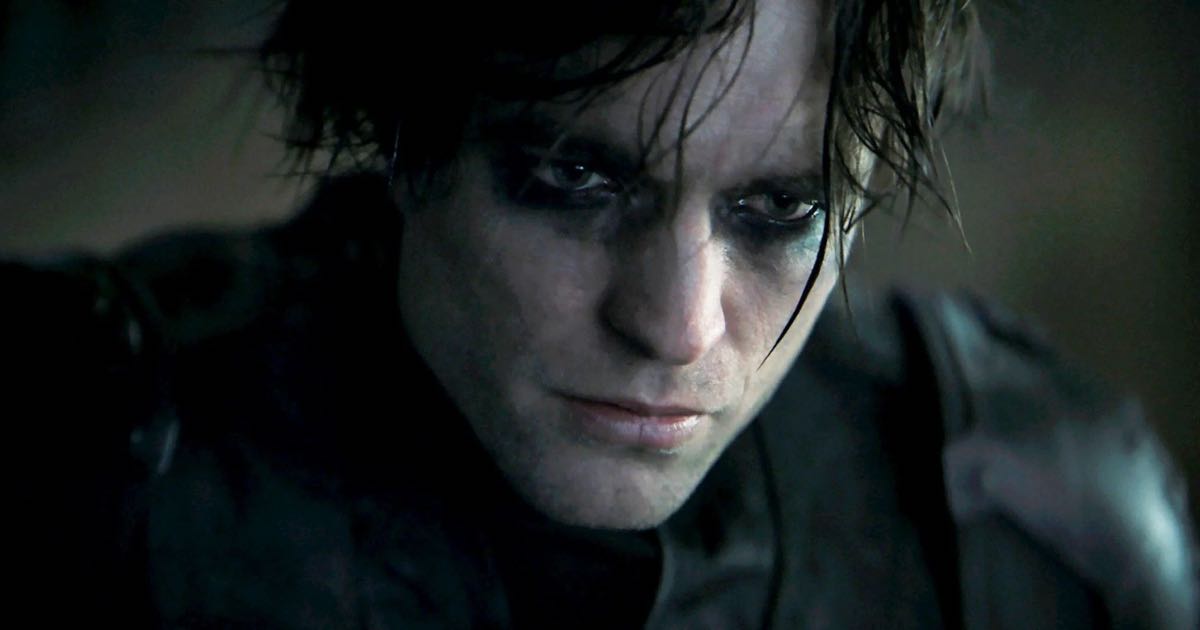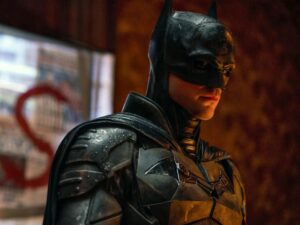(Spoilers) How exactly does one best approach Matt Reeves’ The Batman, is the question I found myself asking the most as I waited for the credits to roll. It is a film deeply concerned with origins, pasts and legacies, both its own, and the fictional character that it depicts. A riddle within a murder mystery, wrapped with unanswered questions from the past. They haunt, confound and persist.
The premise is fairly straightforward. Bruce Wayne, billionaire by day and masked vigilante by night, has been Batman for little over two years now. Gotham is not much better off, and he is not yet the symbol that he will soon become. Trouble comes looking when a foe takes it upon himself to go after the city’s corrupt and criminal, dredging up secrets in the process.
In terms of both plot and theme, the film is perhaps the missing link between Christopher Nolan’s origin story for Batman, and his era-defining The Dark Knight. Mark my words, there is not much to complain about in either, but this film reads like a spiritual successor to Batman Begins, delving into the hows and whys of why Bruce Wayne is the way he is with greater clarity than ever before.
Solo Superhero Films in a Shifting Culture
Having been portrayed by eight different actors in live action films, one wonders what newness is due with each reboot, each subsequent adaptation. In a landscape where superhero films are either reboots, fresh-faced origin stories or simply studio strategies to get audiences invested in a larger shared universe, this simple, in media res approach works wonderfully. I fear that a cultural saturation point regarding cinematic universes is long-due, and solo films that create tight narratives around one character are due for a reappraisal. Perhaps, in that context, Reeves has played his cards right.

The film sets up expectations for a by-the-book origin story by showing a nearly identical murder as the one that spawned Batman from Bruce Wayne, all these years ago. A rich couple hug their son as he plays in their splendid mansion, and then tragedy strikes. An intruder brutally murders the father, and when you start to wonder if you just witnessed the killing of Thomas Wayne, Pattinson’s Batman enters, accompanied by Jim Gordon. Only then does the film truly unmask its influences and homages to the detective genre. Rather apt too, I must say, for a superhero who is part sleuth, part brawler, often heralded the world’s greatest detective.
And sleuthing is precisely what Batman does for the better part of the first half. When Gotham’s incumbent mayor, Don Mitchell Jr is slain just before the re-election, it prompts the memory of another such grisly murder nearly twenty years ago. Thomas Wayne, the beloved billionaire of Gotham, slain in the middle of his mayoral campaign. As Bruce Wayne investigates the case with Commissioner Gordon, he crosses paths with a sinister foe who questions their origins and threatens to expose the crimes of the rich in Gotham city. Enter, the Riddler. We don’t really know who he is, or why he does the things he does. Our only mode of communication to him, as with the characters in the film, is through the riddles he leaves for Batman at each crime scene.
Back to Basics: Honouring Comic Book Origins
More sleuthing ensues and behold: Oswald Cobblepot, a.k.a The Penguin. One of Batman’s long-lasting, legendary foes, he runs a club where the crème de la crème of the city’s criminal underworld gather. Comic aficionados will also recognise that the Iceberg Lounge is also where Batman frequently goes (albeit reluctantly), when he needs information regarding new criminals on his home turf. This is also where he meets Selina Kyle/Catwoman (played by Zoe Kravitz), who works the bar. Their will-they-won’t-they dynamic fully revokes the tension and attraction that underscores their bond in the comics, and is perhaps closer to The Bat and The Cat storyline than previous screen iterations have been.

With the reveal of Selina’s parentage (she’s the illegitimate daughter of mob boss Carmine Falcone) the film sets up similar foils for Batman, in more ways than one. Here they are, two young, flawed individuals struggling with the weight of their past and torn between wanting to do what feels good, and the right thing. The good, even great part of Kravitz’s Catwoman is that she underscores the sleek, feline appeal of the iconic anti-heroine with a genuine heart of gold, one that appeals to the better nature of Bruce’s soul.
“Come on, Vengeance”, she cajoles him, and never have there been a Cat and a Bat with this much obvious screen magic since Michelle Pfeiffer’s turn as the screen siren opposite Michael Keaton’s Batman in Batman Returns (1992).

Noir and Neon: Creating a Mood with Cinematography
The first drawn out fight scene brings in neon red and gaslight yellow for light. Blues and cool tones for all the sleuthing are offset by the flaming neon reds and flashes of yellow that illuminate the bar brawls Batman finds himself in. Yellow and orange make a comeback for the fantastic chase scene in the rain. The updated Batmobile is lit with blue, heavy with yet more gadgetry and ties in visually with the rest. Greg Fraiser’s cinematography retains that impressionistic, gauzy quality that we first saw in Dune (2021), even though the two films are poles apart in tone and temperament.


Reeves’ Gotham is an update to Nolan’s steampunk vision, brought to life with neon lights, grime and dark alleys. Everything about the film feels like an indie production, even within. The Wayne Mansion, for instance, is neither grand, nor rich. It looks like a mausoleum — a decrepit, old house that has fallen into neglect, with its owners gone and their only son becoming a creature of the night. Yet, this is a bold departure from the visual magnificence and wealth one associates with the Wayne identity. In some ways this is even more logical, only elevating the story’s departure from previous portrayals.
Several missing prostitutes, bar brawls, gory murders and riddles later, understanding begins to emerge. The Riddler (Paul Dano), whoever he is, is picking off the rich, powerful and corrupt of Gotham city. Some of his ire can be traced back to Thomas Wayne, whose fund for the city fell into neglect and money laundering after his death. Wayne’s legacy as a good man is also complicated by the fact that his actions and associations with Carmine Falcone, (yet another fixture in Batman comics and narratives, played wonderfully by John Turturro) may have gotten a journalist killed.
Cinematic Influences and Predecessors
Thus, the film does what its predecessors didn’t: question the goodness of the late Waynes. Instead of sealing them away as ossified martyrs, saints of a bygone era slain senselessly, it dares embroil them in Gotham’s filth and woe. Muddying the waters of Bruce’s conscience is the Riddler’s attack on him, the son of the late father, which Alfred intercepts. Now, with no more secrets to come to the fore, the film manages to surprise us still.
Heading towards the climax, one cannot help but feel that the runtime asks a lot of the audience. Sure, the film is paced well, and does a remarkable job of bringing several Batman foes together- no easy feat. Yet, it drags in places. The dialogue is less show, not tell, more show, tell and then tell some more. Yet all petty complaints fall short with the spectacular action, and the well-thought-out set design.
A more Victorian, appropriately gothic, art house Batman than we’ve previously gotten, Robert Pattinson is all smudged liner, raspy whispers and brooding profiles. A play on Pattinson’s rising public profile as an indie darling since his Twilight years, perhaps, but what a deliciously gaunt Batman he is.

We might have had Nolan’s picture-perfect Mr. Wayne and menacing Balebat, with an over-the-top bat growl to boot, and the extended DC verse may have tried to sell us on the idea of Batfleck, but the casting of Pattinson here reminds the audience of the sheer trauma and damage a young man must have gone through to do what Bruce Wayne does, day in and out. Yet this is very much a vigilante who’s been around the block a little by now. Maybe even a lot. Pattinson’s Batman is distinctly angular, chiselled with heavy armour plates — a welcome departure from the suave polish of Bale’s Bruce Wayne, and the cheeky angst of Affleck’s Batman.
Jeffrey Wright is positively avuncular as Jim Gordon. Pattinson does the appropriate amount of brooding. Kravitz is brilliantly charismatic, very appropriately feline. But that’s a good thing, I suppose. The true masterstroke is Andy Serkis as Alfred. By not type-casting him as the villain, Reeves exploits the tender moments between Alfred and his young charge, setting up a lovely little heart-to-heart between the two that, in my opinion, was long due.
Batman and Riddler: Foes or Foils?
But for now, the climax. Riddler’s crimes may have come home to roost, and he may have been caught, but when the explosives he detonates cause flash flooding in the city, the worst of Gotham is brought to the fore. After a rather violent tussle with his followers, hope emerges for the city as Bruce blossoms into the humble beginnings of the symbol he was meant to be, all along.
Yet, the real takeaway of every Batman film is malcontent white men taking things into their own hands. Todd Phillips’ Joker (2019) and the Riddler, are both deeply dissatisfied, social outcasts who feel the world has wronged them. The influence of Taxi Driver’s discontent, disturbed Travis Bickle looms large, and perhaps the resemblance is no fluke either.

Just like Phillips’ film toyed with the idea that Arthur Fleck may be the illegitimate son of Thomas Wayne, The Riddler feels that he and Batman are comrades in arms, that they brought about vengeance on the city together. In doing so, he perhaps precipitates the shift from “I am Vengeance” to “I am Justice”. Two orphans, so similar in age and temperament, divided by intention, action, and finally station.
Few antagonists have been as effective, as skin-crawling and as creepy as Dano manages to be in only 30 minutes of screentime, maybe even less. Don’t let the skinny frame and glasses fool you, he radiates pure malevolence, an agent of chaos. Maybe that makes it all the more satisfying when he finally meets a prisoner implied to be the Clown Prince of Gotham (in a cameo by Barry Keoghan), and they laugh away their shared madness in the confines of their jail cell. In a film that asks you to invest three hours, withholding the villain until the very last serves to keep you on the edge of your seat too.
Conclusion
In positing the villain so close to the hero, extolling their similarities as well as their means to an end, superhero films in general and The Batman in particular, take a promising step in the right direction. Forsaking hero worship, this is a brave, if occasionally heavy-handed foray into identity politics. A search for Batman — as an idea, an individual, and identity — then informs this film. One of Riddler’s puzzles go:
“If you are justice, please do not lie
What is the price of your blind eye?”
I’m reminded of this when I think of the film’s central statement. The real Batman of the film is a multifaceted creature, and there are no qualms about that. Between the gaps of what he was, what he yet may be, and a cautionary tale, stands Bruce Wayne, and the film’s true strength, really, is showing us all these visions at once. Nothing if not unflinchingly honest, the film is at peace with the grey, amoral wasteland Bruce resides in. The real question is, are you?

